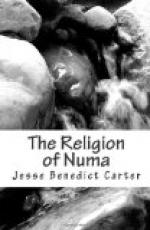Aside from Vesta, the Genius, the Lar, and the Penates, possibly the most important element in family worship was the cult of the dead ancestors. This cult is, of course, common to almost all religions, and its presence in Roman religion is in so far not surprising, but the form in which it occurs there is curious and relatively rare. Just as the living man has a “double,” the Genius, so the dead man also must have a double, but this double is originally not the Genius, who seems to have been thought of at first as ceasing with the individual. On the contrary as death is the great leveller and the remover of individuality, so the double of the dead was not thought of at first as an individual double but merely as forming a part of an indefinite mass of spirits, the “good gods” (Di Manes) as they were called because they were feared as being anything but good. These Di Manes had therefore no specific relation to the individual, and the individual really ceased at death; the only human relation which the Di Manes seem to have preserved was a connection with the living members of the family to which they had originally belonged. It is therefore very misleading to assert that the Romans had from the beginning a belief in immortality, when we instinctively think of the immortality of the individual. The thing that was immortal was not the individual but the family. It is thoroughly in keeping with the practical character of the Roman mind that they did not concern themselves with the place in which these spirits of the dead were supposed to reside, but merely with the door through which they could and did return to earth. We have no accounts of the Lower World until Greece lent her mythology to Rome, and imagination never built anything like the Greek palace of Pluto. But while they did not waste energy in furnishing the Lower World with the fittings of fancy, they did keep a careful guard over the door of egress. This door they called the mundus, and represented it crudely by a trench




